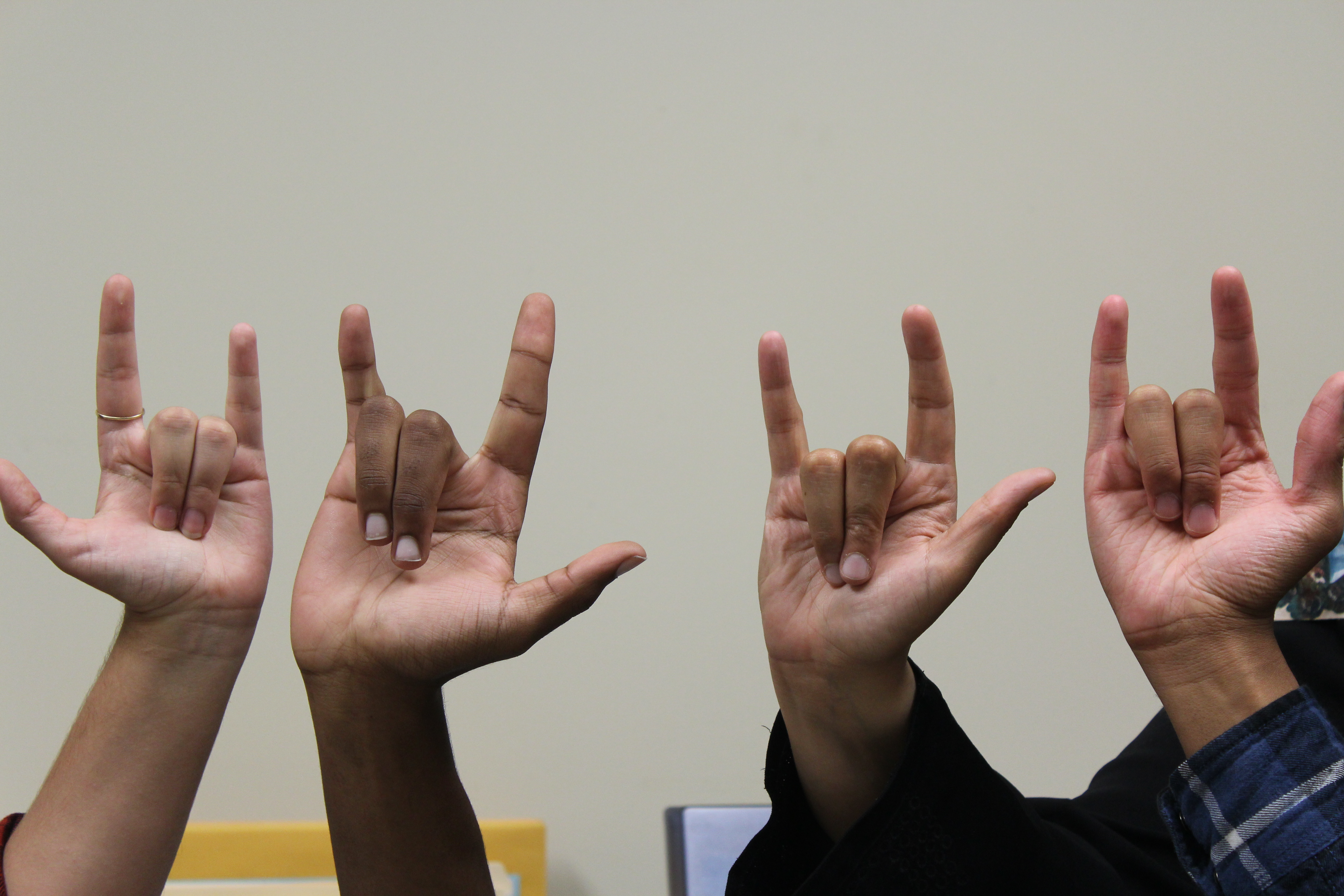HFC’s American Sign Language Program Moving Forward
Gallery

While Henry Ford College’s deaf community consists of a small number of students, interest in American Sign Language (ASL) and deaf culture has been steadily growing. Last fall semester, ASL classes 1, 2, and 3 were added to the school’s curriculum. Now, because of the positive response, the “Deaf Studies” program was created and will be available to students in the 2017 winter semester.
It’s not a shock that students are interested in learning ASL. Opportunities for learners of ASL include the ability to provide access and services to a wider client base in the professional world, or going on to become interpreters. In fact, the new HFC “Deaf Studies” program plans to encourage students to do just that. ASL 4, Fingerspelling and Deaf Communities classes will be added to the current curriculum, completing what’s called a “pre-interpreter program.” After receiving the certificate of completion, students can choose to continue their education and become certified interpreters.
While the “Deaf Studies” program is expanding and gaining more interest from students, HFC professor Nicola Artese, who teaches the ASL classes, says “the disabilities services [on campus] are not really as supportive as they could be,” making it more difficult to cultivate an inclusive culture on campus. Artese was born deaf to Italian parents, then moved to Italy, before returning to the U.S. at a young age due to discrimination. “My parents were pretty much clueless; they were shocked that I was deaf, so they moved back to Italy. Their doctor told them not to stay in Italy with a deaf baby, because there was nothing like the American’s with Disabilities Act (ADA) there.” Without interpreters or guaranteed civil rights, Artese and his family had no choice but to continue his education in America.
The ADA, an American labor law that prohibits discrimination based on disability, is supported by many organizations that provide a number of services to the deaf community. More locally, Michigan has the Division of Deaf, Deafblind and Hard of Hearing (DODDBHH), a part of the Department of Civil Rights, whose mission is to affirm the “indisputable rights of deaf, deafblind, and hard of hearing persons to secure effective communication.” The Michigan Deaf Association (MDA), works alongside the National Association of the Deaf (NAD) in order to ensure the rights and protection of the deaf and hard of hearing community in Michigan. This includes working to educate police on the correct procedures used when interacting with someone who is deaf. For example, it is against the law to cuff a deaf person behind their back because it eliminates their ability to communicate.
The Detroit Association of the Deaf (DAD), celebrating its 100th anniversary this October, is an organization that specializes in creating a social space for deaf communities. The DAD holds fundraisers and hosts events, like a monthly “DINGO” (bingo for the deaf) game. The first Friday of every month at Great Lakes Crossing mall, there is a deaf meetup. Additionally, some coffee shops in Oakland Mall host deaf nights.
Just weeks ago in Oakland County was the 19th annual Ford Arts Beats & Eats, a festival that celebrates art, music, and community. One of the events within the festival was the deaf arts booth, selling and showcasing a variety of deaf artists’ crafts. The Arts Beats and Eats deaf family also welcomed Switched at Birth actor Daniel Durant, who performed original poetry and acted out stories for the audience. This event was held not only to spotlight talent and socialize, but also to educate the hearing community on deaf culture.
Spreading deaf awareness into the mainstream are shows like Freeform’s Switched at Birth, which, since it first aired in 2011, has helped to positively impact the deaf community by allowing hearing people to understand how to communicate with the deaf.
When asked the importance the “Deaf Studies” program at HFC, world languages coordinator Lori Slaber, who played an instrumental part in the forming of the new “Deaf Studies” program, said HFC “had the twin goals of wanting to serve the deaf community and help our students find steady employment,” and added that “Michigan... has the 8th largest number of deaf residents but ranks only 47th in the number of qualified interpreters. That's a huge gap.” Artese stressed the importance of access to communication for the deaf community, having grown up in a time where public school translators did not have a certification program, so communication was not easily accessible. “I grew up without a deaf identity until I went to a deaf college. I wasn't very happy growing up because I was different from my family. I felt really confused.”
While there are yet to be events on campus for deaf students, an ASL Club for students interested in learning ASL and learning about deaf culture is being organized. It is important to remember that the deaf and hearing communities are not really that different-- they both just want communication, access, and respect.
